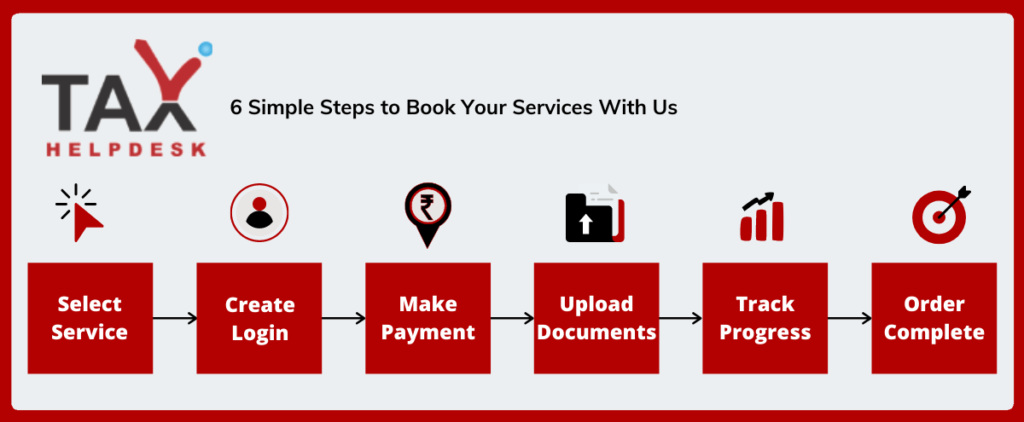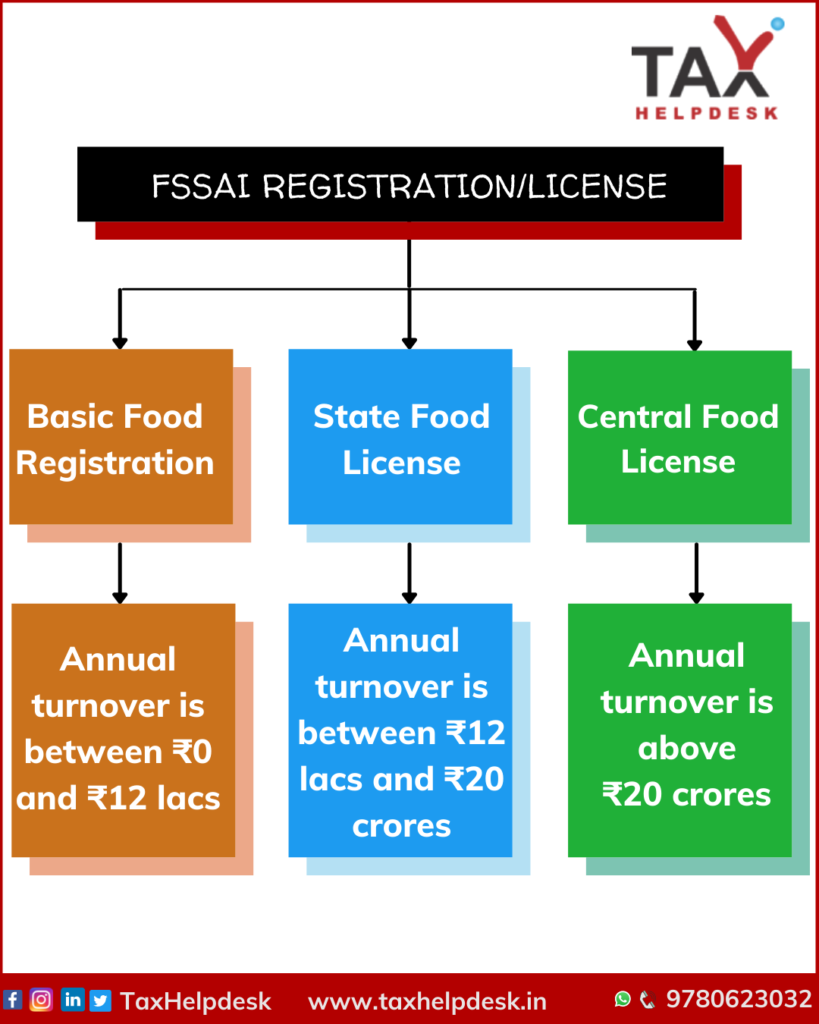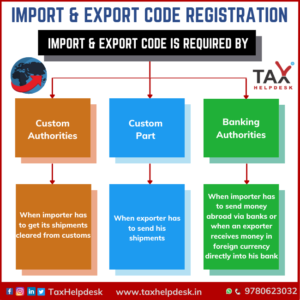- Know About FSSAI Registration
- Who has to obtain FSSAI Registration/License?
- Steps to obtain your FSSAI Registration/License from TaxHelpdesk
- Types of FSSAI Registration/License
- Key steps involved in FSSAI Registration/License
- Documents required for FSSAI Registration/License
- Apart from the above, there are specific documents required for state registration:
- For Central Registration, there are more documents required:
- Benefits of having FSSAI Registration/License
- Consequences of non-compliance with FSSAI Registration/license
- Penalties for non-compliance
- FAQs
Know About FSSAI Registration
FSSAI stands for Foods Safety and Standard Authority of India. It is an autonomous body established under the Food Safety and Standards Act, 2006 with a primary objective of One Nation, One Food Law. Further, it comes under the Ministry of Health and Family Welfare, Government of India. The role of FSSAI is to register / license the Food Business Operators (FBO) in India and lay down the rules and regulations for running the food business in India.
Who has to obtain FSSAI Registration/License?
FSSAI Registration is different from FSSAI License. It meant for petty food manufacturers that includes petty retailer, hawker, itinerant vendor or a temporary stall holder or small or cottage scale industry having annual turnover up to 12 lacs. All food businesses having income more than this limit are required to take a FSSAI license.
Steps to obtain your FSSAI Registration/License from TaxHelpdesk

Once your order is placed, TaxHelpdesk’s dedicated team for reviewing of documents will check the documents uploaded by you within 24 working hours. After reviewing documents, a Tax Expert will be assigned and your order will be processed. Apart from this, you also will be able to check the status of the order in your assigned account.
Types of FSSAI Registration/License
The registration/license of FSSAI depends upon the annual turnover and premises of the food business.

Basic Food Registration | State Food License | Central Food License |
FBO (wholesaler, distributor, supplier, retailer, food vending establishments, hawkers, club, canteen, Dhaba, hotel, restaurants, storage) with an annual turnover of less than Rs. 12 lakh, | FBO (supplier, wholesaler, distributor, retailer, food vending establishments or Dhaba, club, canteen, restaurants) with an annual turnover of between Rs. 12 lakh to up to Rs. 20 crores | FBO ( restaurants, retailer, distributor, supplier) with an annual turnover of more than Rs. 20 crore |
Retailers selling food items, with limited operations | Proprietary Foods | Manufacturing and/or Processing units of vegetable oil by the method of solvent extraction and refineries including oil expeller unit, with a capacity of over 2 metric tonnes per day |
Petty producers manufacturing by itself | Production and/or processing units of vegetable oil by the method of solvent extraction and/or refineries including oil expeller unit. With a turnover between Rs. 12 lacs to Rs. 20 crores annually | Dhaba, club, canteen, and other food vending establishments with branches spread in more than one state and an annual turnover of more than Rs. 12 lakh |
A makeshift stall selling food products | Hotels of 4-star ratings or less | Wholesalers that have an annual turnover of not less than Rs. 30 crores |
Businesses involved in selling food at a social or religious gathering, other than a caterer | Storages having a capacity of less than 50,000 metric tonnes annually | Hotels that have been rated 5-star or more |
Cottage industries associated with food products | 100 % export oriented units involved in food production or processing | |
Production and/or processing units of vegetable oil by the process of solvent extraction and/or refineries including oil expeller system. With a capacity to produce not more than 100 kg/litre per day (except milk or meat) | All food processing units other than the ones mentioned above, including re-packers, with a daily capacity of not less than 100 kg/litre to up to 2 metric tonnes | All Importers (including the import of food ingredients or additives) |
Dairy units, involved in procurement/collection/handling/chilling of milk, having a capacity of not more than 500 litres per day, or up to 2.5 Metric Ton of milk solids annually | Dairy Units (including milk chilling units), with a daily capacity to handle or process, between 500 to 50000 litres | Caterers working under Central Government or related agencies such as Railways, Airlines and airport, Seaport, Defence, etc. |
A slaughtering capacity of not more than 2 large animals or 10 small animals or 50 poultry birds per day | A daily slaughtering capacity of more than 2 and up to 50 large animals. Or the capacity of handling more than 10 and up to 150 small animals. Or daily capacity of more than 50 to up to 1000 poultry birds | Storages with a capacity of more than 50,000 metric tonnes |
Dairy Units (including chilling units), with a capacity to handle or process, over 50,000 litres per day | ||
A slaughtering capacity of over 50 large animals or more than 150 small animals or more than 1000 poultry birds per day | ||
All food processing units other than mentioned above including re-packers, (excluding the grains, pulses & cereals milling units) with a capacity of over 2 metric tonnes per day | ||
All FBOs involved in producing an item of food, additive or its ingredient, using some new process or technology, and/or a combination thereof, whose safety has not been established yet by the FSSAI. Or they may not have a history of safe usage. It covers the food articles being introduced in the country, for the first time |
Key steps involved in FSSAI Registration/License

Documents required for FSSAI Registration/License
– Application form – Form A or Form B which is signed by the applicant
– Two Photographs of the Applicant- recent
– PAN Card of Executives of the Business
– Rent Agreement
– Utility Bills if the premises is owned by the applicant
– In case the firm is a partnership, then the copy of the partnership deed must be taken
– Food Products and Category List
– AOA and MOA in case the entity is a company
– Board Resolution- Form X for the purposes of appointment
– Aadhaar and Voted ID- Identification Documents
Apart from the above, there are specific documents required for state registration:
– Layout of Premises with Machine Plan
– NOC
– Permit from manufacture if required
– Food Products Details
– Copies of Relevant Food Safety Management Systems
For Central Registration, there are more documents required:
– Layout of Premises with Machine Plan
– NOC
– Permit from manufacture if required
– Food Products Details
– Copies of Relevant Food Safety Management Systems
– Water Analysis and Report from Laboratory
– Information on Annual Turnover
– Details of Supply and Procurement of Milk and Meat
– IEC Certificate
– NOC from FSSAI
– Pesticide Residual Report- If business is engaged in Mineral Water Production
Benefits of having FSSAI Registration/License
– Creates trust in people
– Compliance with laws
– Increases reputation of the food business
– Ensures food safety
– Helps in business expansion
Consequences of non-compliance with FSSAI Registration/license
The food businesses which are required to obtain FSSAI Registration/license have to comply with the rules and regulations under the Foods Standards and Safety Act, 2006. If the business fails to comply with such rules and regulations, then an improvement notice can be sent by the Food Safety Officer. If the business still fails to abide by the improvement notice, then the officer after giving the licensee an opportunity to show cause may cancel his license.
Penalties for non-compliance
Particulars | Fine |
Food quality not in compliance with act | 2 Lakh Petty manufacturer – 25,000/- |
Sub-standard food | 5 Lakh |
Misbranded Food | 3 Lakh |
Misleading advertisement or false description | 10 Lakh |
Extraneous matter in food | 1 Lakh |
Failure to comply with Food safety officer direction | 2 Lakh |
Unhygienic processing or manufacture | 1 Lakh |
FAQs
It can be acquired for a period ranging anywhere from 1 year to 5 years. While applying, one can decide for how long he wishes to obtain the license. The fee may also vary according to the period chosen.
One needs to renew his FSSAI Registration/license before the expiry of its validity period. In case the person ends up missing the date of renewal of the application, he will have to apply if he wishes to continue with his food business operations.
Yes, any Food Business Operator (FBO) can appeal to the State Commissioner of Food Safety, if he/she is aggrieved by the improvement notice or suspension/cancellation of licence. The decision of the Food and Safety Commissioner shall be final. Alternatively, an FBO can also approach the Food Safety Appellate Tribunal/ High Court of their respective States/UTs to challenge the notice.



















Reviews
There are no reviews yet.